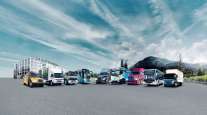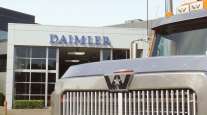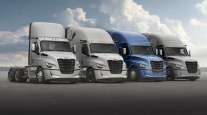Senior Reporter
DTNA Opens Site for Fueling EVs

[Stay on top of transportation news: Get TTNews in your inbox.]
Daimler Trucks North America and Portland General Electric announced the opening in Portland, Ore., of what they called the first-of-its-kind heavy-duty electric truck charging site.
Known as Electric Island, the site is intended to help accelerate the development, testing and deployment of tank-to-wheel zero-emission commercial vehicles.
Electric Island is across the street from DTNA headquarters, less than one mile from I-5, and represents the first location specifically designed for medium- and heavy-duty trucks aligned to the blueprint of the West Coast Clean Transit Corridor Initiative. WCCTCI’s collaboration among nine electric utilities and two government agencies yielded a strategic plan in 2020 to electrify 1,300 miles of I-5 across the three West Coast states to provide publicly available charging for freight and delivery trucks.
In related news, DTNA reported its Class 8 Freightliner eCascadia and medium-duty eM2 are available to order.
Electric Island opens with eight vehicle-charging stations — a majority of which are available for public use — for the charging of electric cars, buses, box vans and semi-trucks. It will allow both PGE and DTNA to study energy management, charger use and performance, and, in the case of DTNA, its own vehicles’ charging performance, according to the Portland, Ore.-based truck maker.
The site is designed to keep Electric Island future-proof, allowing the chargers of today to be replaced with new charger technologies of the future, including the planned 1+ megawatt chargers, when they are released. Additional plans for future on-site energy storage, solar power generation, and a product and technology showcase building remain under development.
“As Portland begins to move toward recovery from the pandemic and its economic impacts, we are still faced with the climate crisis, so it’s essential that we focus on opportunities to support the growth of the green economy and lead the way on a just transition to a low-carbon future. Electric Island is a great example of the kind of collaboration and innovation we need to do so,” Portland Mayor Ted Wheeler said in a release.

The chargers operational today are designed to support future charging levels of up to greater than one megawatt, as the technology is available. (DTNA/PGE)
The site is also intended to inform each company’s efforts by studying the future of heavy-duty charging, including:
- Use of vehicle chargers featuring power delivery of up to over one megawatt (more than four times faster than today’s fastest light-duty vehicle chargers), enabling PGE and DTNA to develop best practices for cost-effective future deployments;
- Integration of heavy-duty charging technology into PGE’s Smart Grid, such as vehicle-to-grid technologies, second-life use of Daimler’s battery packs, and onsite energy generation; and
- Testing information technology opportunities like fleet and energy management by captive solutions and services.
Meanwhile, DTNA placed 38 Freightliner electric trucks into operation with fleets covering a variety of applications, including drayage, regional and local pickup and delivery, and food and beverage delivery. They have accumulated nearly 750,000 collective miles.
The start of production is slated for late 2022.
DTNA offers customers an integrated approach that enables them to select and specify, as an additional service, the resources of an e-consulting team to assist and advise on the holistic ecosystem needed to integrate battery-electric vehicles into their fleets. Freightliner dealers are prepared to support the end-to-end process of fleet electrification, according to the company.
Detroit technologies included in the series-production eCascadia and eM2 are: the all-new Detroit ePowertrain, the Detroit Assurance suite of safety systems and the advanced telematics service of Detroit Connect.
Comprising an eAxle design and available with a single- or dual-motor system, the Detroit ePowertrain offers up to 23,000 pound-feet of torque, giving it ample power for the eCascadia’s GCWR of 82,000 pounds. DTNA said the maximum range for the eM2 will be 230 miles on a full charge and 250 miles for the eCascadia tractor.
Want more news? Listen to today's daily briefing below or go here for more info:




